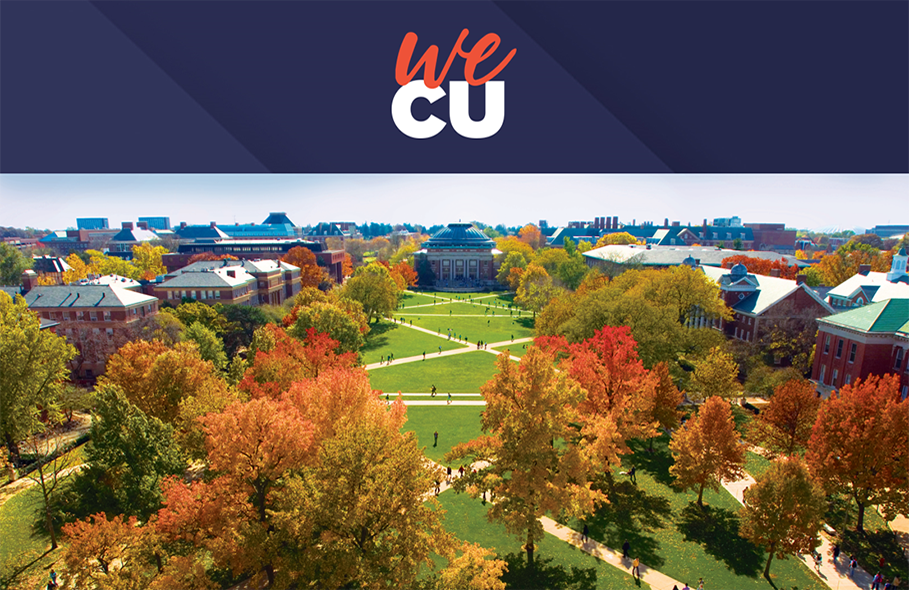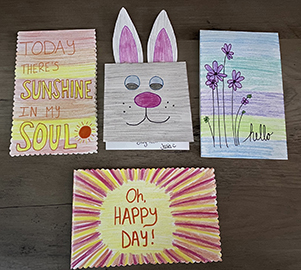We CU Program Empowers Students, Strengthens Community
by Ashley Lawrence / Sep 8, 2020

In 2020, our sense of community and social practice has been upended, redefined, and reimagined amid the global coronavirus pandemic and nationwide reactions to racial injustices. One solution that has emerged, thanks to the “silver lining of opportunity” from these crises—We CU.
We CU is a program designed to support transformative learning experiences for University of Illinois students by empowering them to meet the needs of the local community. It brings together the university community and people within the surrounding communities. We CU is a service-centered public engagement program that matches students with local community-based organizations and projects. The campus-wide program is open to undergraduate and graduate students alike. We CU has been supported at the outset by the Office of the Chancellor, Center for Social and Behavioral Science (CSBS), Interdisciplinary Health Sciences Institute (IHSI), School of Social Work, Siebel Center for Design, and the College of Education. New campus sponsors include the Humanities Research Institute, College of Liberal Arts and Sciences, and the University of Illinois Alumni Association.
The initiative was conceptualized in response to priorities identified during the university’s “The Next 150” strategic planning process—specifically, that public engagement become a formalized part of the Illinois student experience. The program’s goal is to develop Illinois students to be future leaders who grasp the unique commitments, traditions, and challenges of distinct communities by facilitating service learning and volunteering opportunities with campus and off-campus organizations.
With its deep understanding of community engagement at the local level, the College of Education was well-positioned to lead this charge.
“For years there have been various efforts and discussions across campus regarding the need to grow, organize, and measure our impact with community organizations since public engagement is significant to our university’s land grant mission,” says Dean James D. Anderson, a member of the Public Engagement subcommittee for the Strategic Plan. “Our College is committed to a culture of community engagement, and the larger idea of being an engaged university rather than a university that also does engagement. Through our College’s investment in We CU, we are underscoring service as one of our core values and leading the way for a meaningful, rewarding experience for everyone.”
 Emily Stone, research development manager for the College of Education and IHSI, together with Katie Shumway in the School of Social Work, are co-directors of We CU and are the driving force behind the public engagement program. Emily also credits Erin Budesheim, Gabby Drong, and Ananya Tiwari (winner of the 2020 Illinois Innovation Prize) all Educational Psychology graduate students, for providing key leadership and student support as the program came together.
Emily Stone, research development manager for the College of Education and IHSI, together with Katie Shumway in the School of Social Work, are co-directors of We CU and are the driving force behind the public engagement program. Emily also credits Erin Budesheim, Gabby Drong, and Ananya Tiwari (winner of the 2020 Illinois Innovation Prize) all Educational Psychology graduate students, for providing key leadership and student support as the program came together.
“Seeing the passion and excitement of students to volunteer and meet community needs inspires me,” says Stone. “We anticipated running a pilot of We CU with about 100 students this summer, but when 450 signed up for our information sessions we knew the program would be much larger.”
Pilot Program Focused on Pandemic
The onset of the pandemic created urgent needs for community organizations, as well as a heightened desire for connection and purpose for many students—accelerating the We CU program’s launch timeline and participation numbers.
On June 1, 2020, We CU officially launched a 10-week summer pilot program to address local community needs during the COVID-19 pandemic. Some 232 students representing 12 colleges from across the Urbana-Champaign campus became the inaugural cohort of We CU Community Engaged Scholars. Using GivePulse, an online platform that lists volunteer opportunities and tracks service hours, We CU students were matched with one or more of the nearly 50 volunteer projects—all of which could be completed 100% remotely—submitted by 34 local organizations. Scholars received online training and were able to apply for “mini-grants” to offset costs associated with service activities.
We CU students logged a combined 4,504 hours of community outreach during the pilot.
 Julia Poel, sophomore in Elementary Education, worked with the Serve Illinois Commission on a project called Letters Against Isolation. The project involved writing and sending letters to self-isolating seniors in nursing homes and care centers in the community, with the goal of brightening their day and mitigating feelings of loneliness and depression during the COVID-19 health crisis’ restrictions on visitors.
Julia Poel, sophomore in Elementary Education, worked with the Serve Illinois Commission on a project called Letters Against Isolation. The project involved writing and sending letters to self-isolating seniors in nursing homes and care centers in the community, with the goal of brightening their day and mitigating feelings of loneliness and depression during the COVID-19 health crisis’ restrictions on visitors.
She describes the project as a fulfilling experience. “It is rewarding to know that my work on these letters will help someone else have a good day during this time of isolation,” Julia says. “By combatting loneliness, I am helping my community care for our seniors’ mental and physical health.”
Other COVID-19 related service projects included developing contact tracing methods, sewing re-usable face masks, helping organizations move their in-person activities to virtual platforms, and more.
“We saw an opportunity to create community for students as they work together on these projects, and to provide support for organizations who needed rapid help moving things online that were never online before,” says Stone.
Students who completed at least 40 hours of service during the 10-week pilot program were recognized during the virtual We CU Scholar Recognition Ceremony on August 13.
Future Directions
Consistent evaluation and revision of the program is essential to its future success, says Christopher Napolitano, Educational Psychology faculty member and part of a research team assessing We CU. With the success of the 10-week pilot program, there is plenty of participation data to measure impact and help shape an improved future experience. Madison Sewell, doctoral student in EPSY's Developmental Sciences and part of the research team, is currently analyzing data from the pilot program to provide insights for publications and program adjustments.
Additionally, Stone, along with the Chancellor’s Office, is working to leverage the summer pilot program’s success to secure additional funding to support a full four-year We CU Community Engaged Scholars framework for all incoming students. The full program will honor students at graduation who have completed 300-400 hours of service during their academic career.
Stone says the group plans to continue to host service challenges, similar to the 10-week focus on COVID-19 projects, providing more chances for students to make a difference in the community.
“We’ve heard from our students how deeply impacted they are by the murders of George Floyd, Breonna Taylor, and others, and by our country’s broader systemic racism,” says Stone. “We are looking to develop more opportunities for students to support causes connected to social and racial justice.”
Connect with We CU on Facebook or Twitter for program announcements and more information. If you are interested in becoming a partner unit or organization, please contact We CU co-directors Emily Stone and Katie Shumway at we-cu@illinois.edu.